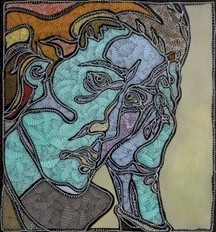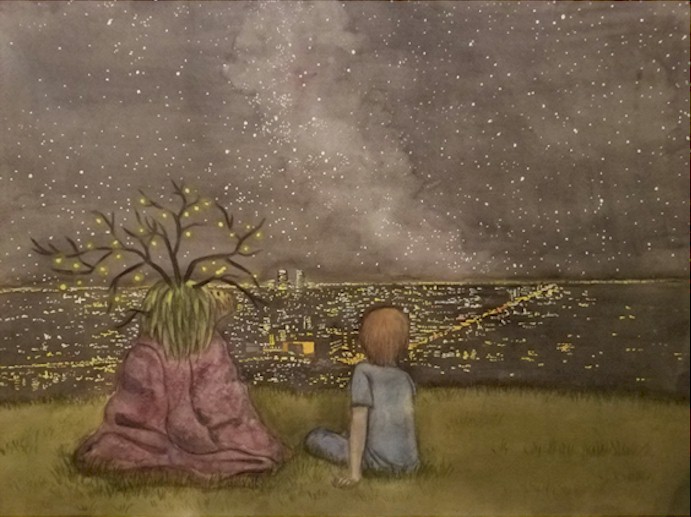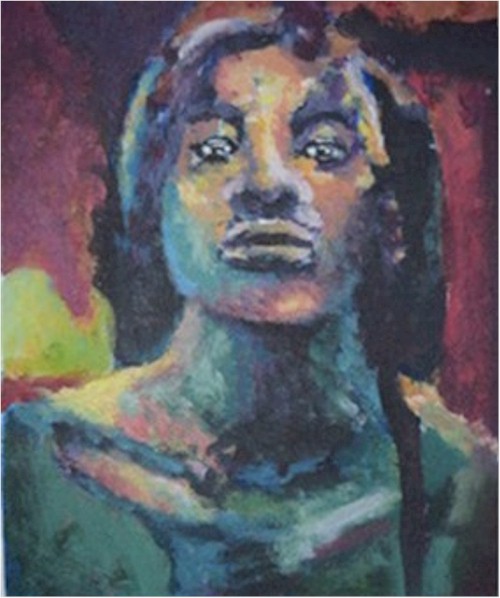
|
Welcome to the Summer 2019 issue of the Portland Metrozine - a growing online community of writers, artists, and deep thinkers who, from around the world, share their ever-evolving literary work, visual art, and positive community vision. Our beginnings… This historic “Metrozine” debuted in 1991 as Poor Joe’s Guide, a print publication designed, developed, published, and distributed by a tightly-knit community of artists and writers. The Guide rapidly evolved into the literary journal, Portland Metrozine. In 2019, original publisher, Joseph Corrado, and editor, Basha Krasnoff, resumed publication as an online literary journal. In keeping with its legacy and with renewed vigor, the Metrozine eagerly anticipates the future with hope and continues to champion development and cooperation within the creative community with deep respect for expression through diverse lenses. About this issue… The Metrozine offers a safe space for creatives in our global community to share their unique expressions of life experience and their developing understanding of what it means to be fully and freely alive in this world. In this Summer 2019 issue, you will find stories, poems, memories, and images about times of vulnerability and violation. And if you read on, you will meet women and men who grow stronger because of their experiences. Join them as they continue to weave the threads of their lives in fearless pursuit of wholeness and truth. Cover Artwork… Artist Marta Kalinska’s “Closer Look” was inspired by Dorothea Lange, whose photographs captured the stark reality of the Great Depression era. The subject of her painting is the 19-year-old Ruby Nell Shepard who Lange captured looking off into the distance seemingly dissociated from the bleak reality of her surroundings.
Marta found this “distancing” familiar and externalized that “knowing” in her painting. She thinks that this creative process “gives her the space to dissolve her hypervigilant ego and engage in this absorptive act that permits multiple versions of the subject to exist cohesively and concurrently.” Upon close inspection, her pieces reveal multiple layers of built-upon medium that creates the painting’s unique finished appearance. According to Marta, this method is time consuming and her reliance on it reflects her vulnerability as an artist because “what the viewer sees is the culmination of gently guided mistakes. Accepted mistakes.” We welcome submissions from creative writers, artists, activists, and deep-thinkers around the world. The Metrozine community encourages the avant-garde, the experimental, and the arcane in fiction, non-fiction, and poetry. We also welcome submissions of visual artwork, including drawings, photographs, and facsimiles of paintings. Buoyed by the thriving literary community of Portland, Oregon, we reach out to the global community to inspire, encourage and broadcast creative expression. Wherever you are on planet Earth, we welcome you to share your vision, your voice, and your point of view!
|
By Dustin Hendrick
It is 1999 for a few moments longer. Soon the clock will strike midnight. The world will end. The computers will all die and we'll all be left to our own wits and wiles, adrift in a lonesome, violent world of dirty-faced bandits and burning cars. We will take to the forests and only come out at night to forage in what used to be our hometown for canned goods that we will bash open with rocks. We'll suck out the contents and cut our lips on the jagged rims. The cuts will become infected and our once beautiful faces will bear marks of permanent disfigurement.
I don't know how to use a gun, but I can learn. I can pick it up quickly. We can make homemade explosives from the chemicals in my dad's garage and drive a truck outfitted with rusty metal armor and spikes made of bone – functional, and of the style expected from a vehicle driven through the no man’s land to come.
I wonder how much time we have left to prepare. Will the power shut off immediately? When will the raiding begin? Will we be safe in the city?
You and I have been on the outs for a while now. I'm so sick of waking up next to you that I get up deliberately early and relocate to the couch to finish my sleep cycle. You roll your eyes when I talk about most anything. You think I haven't noticed, but I have, and now I do it too. I used to love it when you'd play Jeff Buckley songs on your guitar, and now I want to make puke faces at the first sign of a strum. I want to mock the friends who still clap for you and then drink myself stupid.
I still love you, though. I tell myself those words repeatedly, even though I'm wise enough to know that I'm too young to know the first thing about love. But no one else has ever wanted to be with me like this, even if it's not really what I want. A piece of me – a dark piece that sees far too much of the truth for my liking – tells me how pathetic I am for staying. I know. Believe me, I know. But everyone says how good we are together. I won't let them see how untrue that is. The shame would eat me alive.
We'll be okay. We will. This collapse that's coming any minute now, it'll change us both. We'll learn new things and forget the old ones that don’t matter anymore. We'll forget all of the things that make us miserable when we're together. We need each other now. I'll get good with a skinning knife and you can hunt for food. We can take in orphans and strays to live with us in our treehouse, our cave, the collection of city busses we’ve attached with flat boards and chains that will be our home. We can rename them, our children – clever names that match their scars and skills. We'll raise them to be stronger than we ever were.
Our families; what will become of them? Perhaps we can form our own clan. Safety in numbers, they say, and family will never betray you. Or maybe they will. Who can say how the chaos and the violence to come will affect us? Maybe a clean break is what's needed here. It's a rebirth of sorts for everyone, everywhere.
I think sometimes – though I've never once voiced it – that you never loved me, and I never loved you, not really. I think we were the last two gays in this fucked up town. Rarities. Lonely, like you'd expect something rare to be. All of the others like us have long since left for the city by now. We remained, and because we did it was just expected that we'd do this, partner up even though it was never a great match, or even a good one. I think we became what everyone wanted to see. I think you wish I was someone else. I wish I was too, at least when I'm with you.
It's cold on this porch, and I can tell you want to go back inside. I do too, but I stay outside, shivering as my cigarette burns down un-smoked between my fingers. The smoke tastes wrong on my tongue. Of course it does. The candy disk I swallowed over an hour ago, coated with liquid LSD, has at last begun its winding path into the avenues of my brain. I can hear my own thoughts like someone else stole my voice and is now singing them back into my skull, mocking me. They collect there, my vibrating thoughts, a dissonant pool of things I want to say but never will. You stay outside too, and as I look you in the eyes for the first time in days, I see the same strain, the same remote sadness that I know you can see in my own. You might be smiling, or maybe your mouth is moving too fast for my eyes to keep up. But you know what I want to say. We've both told ourselves that this is the right time to leave. It’s a gift to both of us, really, to go out on a night of celebration like this. A way to ease the pain of it.
And then we go to bed, alone.
And then we start our lives again, on New Year's Day, a new millennium ahead.
I'm imagining the fireworks before they begin. They'll be the signal to get started, the usher to hurry us into this new, primitive world. I haven't stockpiled, but I know where to find things we'll need to survive. I've lived here my whole life, after all. I grew up outside of town, on a lonely farm. I must know something of gardening, of husbandry. The thought of killing for food turns my soul and my stomach, but I imagine our first hard winter will change that. I'll start using bow and arrow even before our bullets have run out, and you’ll be so impressed at how strong I’ll become, how useful.
Our friends are calling to us from inside. Their voices pour like violet-tinged syrup through the kitchen window. Get ready, they say, get in here. The final shots of the '90s are poured, and if we don't go in soon they'll be gone.
Most of them will probably not survive, but we will. We have each other, and it's more than anyone inside can say, the sad, perpetually single fools. And on nights when we're so sad at our losses we can do nothing but weep, we can turn to the other and think "But I never lost you." It's a love story; a dark, dirty love story just waiting to happen. It’s the only sliver of pure good to come from the death of the world we know.
You say nothing. You smoke and stare at the ground. I tell myself not to hold your hand, but then I do, and you give no sign that I've touched you at all. The air in my throat feels like cotton, like sugar, like change is coming. I’m afraid, but I’ll manage.

It's 11:57. Time moves so slowly when I’m sad. Janis Joplin is singing in the house. " Kozmic Blues" slides out to me discretely from the open window, from the thin gap of light under the door. She's calling us in. She knows something big is happening. She knows from the silence that it probably isn't good. The lyrics vibrate in the night air, and I see for a moment her apparition. Janis, in the fog across the street, her smile mischievous and wide, her pink feather boa touching the pavement, a bottle of something strong hanging loosely in her hand. She walks off into the night, into a vertical fold of time, and I wish I could go with her. No one could, no one ever could, she sings in her encore.
I laugh to myself, but you say silent. Say you want to go, so I don't have to.
We keep missing the moment, filling the space with silence. We are more alike in some ways than I'd care to admit, though it never could save us. It should be enough, or it was for a time. I'm seized momentarily by how brief that time actually was, though it feels like years in this moment. I wonder how it feels for you, but I don't want you to tell me. I just want this to be done, and I'm sorry. If I regret later, I'll deal with it on my own. You don't have to help me anymore.
It's midnight now. Cheers and small explosions erupt from all around us. Everything is so loud. The sounds move through me like waves of ocean water, through my body, soaking my bones, stealing the warmth from my blood as they pass through. Children shriek from inside their homes. You are animate, at last, and you pull me to my feet. They feel like hard rubber blocks at the bottom of my legs, but I’ll manage. I’ll have to if I plan to survive at all once the laws and police are all gone. I’ll have to be on my toes, to have my wits about me all the time. I’ll be okay. We’ll find a way to be happy.
The door opens to the party, to a blast of yellow and orange illumination, and we are both different people now, in the span of our cigarettes. I wait, for a moment, in hopes that Janis might still be out there, singing, waiting. But she’s not there. She’s gone.
Time to go in, to end it all and begin again. One last glance into the dark. The streetlights shine brighter than they should. It could be the acid, working it's slow-fast magic on my insides, or they could be saying goodbye.
By Daniel Edward Moore
Anthem
Isn’t this what the body becomes
line after lung after lips drooling words
a national hymn of critical concerns
for answers to the bleed the break &
the burn & why the spine’s binder of dust
opening & closing day after day
becomes a pole at the end of the street
to fly something no one would die for or keep
folded within themselves?
We’ve all stood too long in the rain
the palm of our hands blinding a heart
everyone hoped was dying to stay
as long as the anthem played.
Isn’t this what the body becomes?
Elegy for a Sociopath
Raised on the gospel of make Death Happy
one blade one bullet one stranger at a time
he majored in the dogma of disappearance
an ungodly apparition possessed with power
to alter the course of life in a moment
to end the course of life not completed
reeking failure on the body’s beauty
reeking doom on beauty’s need
for a body to worship its fear of time
as some kind of servant worth saving
nothing with skin nothing that breathed
made it to the sentence worth saying
speech was not part of death’s dissertation
words were not uttered between hands and gloves
silence remained destruction’s last song
even when tears were shed for the lost
even when conscience forgot how to feel
when intimacy was aborted
Cross Talk
Or if you can
say it better please
do anything to spare
my lungs from thinking
my throat has a dignified purpose beyond
spewing the sound of your name
like a geyser a slick black noun
of misunderstandings called
personality changes the
monopoly version of
I’ll be the battleship
you be the thimble
& weave me a raft
as the ocean boils
to temperatures
meaning the
world has a
fever love
can’t
quench
with
words.
Bloodstone Song
Angels hold me now
halfway between ballroom & beast
a place on the map wrinkled by sweat
my fearful hand is forced to provide
so you can fully comprehend
the torment of winged things
that fluttering fall love strips you with
before suffering’s arterial river
drags you downstream to a cradle’s rock
where lips are taught a bloodstone song
the ripple of becoming.
By Scott Archer Jones
At six a.m. he strode back and forth in the road. Across the ditch and the big front yard, he could see the lights in the kitchen. He sidled over to the next window. The candle burned on the dining room table. That's when he knew. She always lit the candle when sentiment swept over her, a sentiment that led to the giving of herself. Led to surrendering herself to a man. Once to him.
He slunk closer – he couldn't see her face. He was sure it was her.
Skulking there in her road, in disguise, must have been a plan, but he didn't know who had made it. What was he doing there? He wore the new coat and also a hat he hadn't worn for years. The muffler circled his throat dull and black, anyone's scarf. Even the breath, someone's breath, swirled out gray and ghostly, exiting the scene up into the dark, wreathing him in a disguise. He should walk down to the end of the road and back; he should maintain the disguise with lying steps. Just a guy out for a walk.
The houses were far back, and small. They deserved their isolation, set on big lots out here on the edge of town. Back, back to her house, as if he was reeled in by a string that she held. His steps stumbling a little in the unevenness of the grass, he caught a glimpse of her through the sheers, at the table. There in front of the candle, she was writing, writing. On paper as white as the curtains. In front of the candle that should have been lit for him. He was paralyzed peering into the room, beside himself with anguish. He could see his breath, as gray as the winding sheet around a corpse. He rubbed his frozen painful face, his shoulders hunched in the sharpness of winter. He was dead cold, but his blood hammered, his pulse jumped. He felt his eyes starting out of his skull, his head beginning to explode.
The breakup hadn't happened here, not at this house – the meltdown had ripped through his place and shredded its way out his door. His life stopped when she had slammed that door.
She had come into his home office, laid a hand on his shoulder, said his name. He turned. She was so beautiful, perfect really. Tall and graceful like a sapling in the wind. Her face so fair, her nose a snub, her mouth an unhappy shape. She took two steps back, leaned away. She flipped her blonde hair; she always made that gesture before she spoke. “I can't take it any more. I've thought hard about it, and I can't do this. Not since last night.”
“Last night? I told you, it'll never happen again.”
She shook her head. A bright bomb of light as her hair created a whirlpool around her skull. “I have to break this off – it's no good for either of us.”
What could she mean? “You mean you're not going to move in like I planned? Okay, I understand. Too fast. You can keep your place.”
She crossed her arms, kept backing up until she reached the door jamb. “I don't want us to be together. In fact, I don't want to ever see you again.”
He glanced down at his hands in his lap. They were clenching and unclenching. “No. It's not going to be that way.”
“My girlfriend's picking me up now. My bag's by the door.”
What had he said then? He couldn't remember. He followed her through the house, seized her arm. There was screaming, maybe his. Her eyes were like a wild animal's, open so wide, so blue. She jerked herself out of his hand. Ran through the door to the car. She left the suitcase.
He could remember – putting his head on the door, leaning against it with the wood molding pressing into his forehead. He smashed his hand into the sheetrock beside the door, cutting it, breaking two knuckles and the little finger. He hadn't been able to use the keyboard for a week.
Now he watched her finish the letter, as he touched the frame of the window. He watched her hands in the candlelight, her arms, so beautifully brown like caramel.
It was a letter that should have been written to him. He could see her fold it in thirds, saw it as it slipped into its paper reliquary. She had written a letter, in that delicate, scratchy hand of hers, bowing down her face to the paper that lay before the candle, a candle that should have been lit for him. He watched as she stamped it – she looked up the address from her book, not a known address like the one she had so often written three years ago. Not his address.
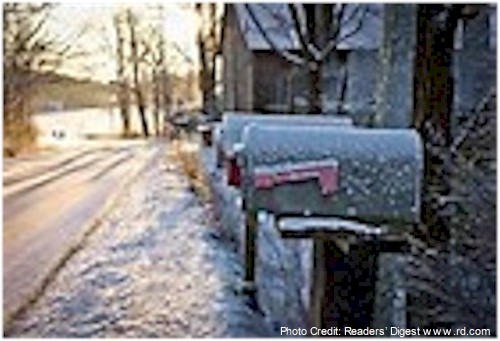
Soon she would make another cup of tea, from the limp teabag she had already used and he would watch again through the kitchen window. She would eat a small carton of fat free yogurt, a piece of toast. She would come out to the small silver car in the dark; she would stop at the mailbox and place the letter there. It would lie in wait for the postman, an intermediary of focus, of infatuation, of love. A letter that should have been his.
The spruce branches were scratching at him, moving in the cold wind. His eyes knew her intimately, the black hair, the smooth brown skin, the eyes so dark. Why had she changed her hair color? His eyes fondled their way over her long muffler, the short jacket, the jeans slightly too tight where she carried extra pounds he loved. The door of the car slammed, cutting off his adoration. She drove away. He emerged from behind the blue spruce. The chill seized him now – his teeth chattered. How could she drive away? Involuntary twitches raced through his shoulders. He clenched all the muscles in his body to stop the trembling. In the watery predawn, in the sad winter, the letter called to him. The tomb-shaped opening of the mailbox gaped black in front of him, the letter lay white and waiting, the space small and intimate. The envelope leapt across the space as his fingers approached it, at least he felt it did, offering itself into his hands. He slapped the door shut, dropped the flag. He glanced up and down the road, guilty, secretive, caught in his own act.
On the envelope she had inscribed a name, the name. He had the name now. But what had she said? Did she use the same words, the same motif, the same song she had once used for him, in the beginning three years ago? He marched to his SUV, the letter held firm inside the coat against his chest. He dropped it on the console by his phone and he traveled home. The envelope lay there in the corner of his vision, waiting. At his breakfast bar, he shoved aside unread papers, a stack of mail, a coffee cup that dropped to the floor and – unnoticed – broken. The letter, white against the red tile, named his rival. He knew now to hate a man named Jeremy. He scribbled down the address on a cover of a magazine about wine. Fishing a six-inch deboning knife out of the wooden block, he teased the letter open.
Words crawled like ants in front of him – she was in love. He trod on the broken cup, kicked pieces aside. Something awful should happen to Jeremy.
An old woman lived on the corner up from her house – Neighbor One. She had an overactive fox terrier that she wasn't walking. He offered, she accepted, deal struck, but he was no better for it. He would take the little beast out twice a day, up and down the block, past the mailbox, past the table and the candle. After dark and without a dog, he could return to wait for Jeremy. How long would it be, days, a week before her arms opened in welcome for Jeremy?
He sidled up to her mailbox, opened it and rummaged it while the terrier sniffed at the post. Piss flowed across the frozen ground and around his shoe. A note from Jeremy, blue envelope, magic tape on the flap. Down the road they went, the dog darting to the right and left as he strolled, all slow and innocent. As the terrier rushed up to the leash end, he delivered satisfying little pops that jerked the animal, the oblivious dog straining at the lead.
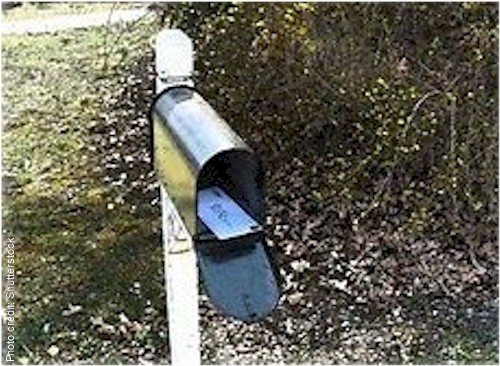
When he reached the next box, he opened it also. Why not? They had committed the odious crime of being her neighbors. He found a statement from the bank and an envelope from a mortgage company –they dropped into the copious pocket of his pea jacket. At the next residence he purloined advertising supplements that he deposited further down on the other side in the fourth neighbor's mailbox. Neighbor Seven provided two personal letters and a catalogue in a brown paper wrapper. He slipped it halfway out – a catalogue for male latex clothing. He gave it to Neighbor Eight's mailbox, down at the dead end of the street.
He found it a pity the road had so few houses, he so enjoyed the series of senseless petty acts. Maybe he would write them, tell them what she had done to him. A love letter in every box. He returned up to the corner, dumped the dog on the grateful old woman. She bent crooning to the short-haired little rat – he came close to kicking both of them. In the SUV, he filed his new mail in the console, cruising home, smug – now he would put a voice on Jeremy, having his letter, having his secret words, having his balls.
At the breakfast bar, he discovered Jeremy's letter to be – horrible. He didn't want to read it, to cut at himself with their happiness, but he had to know. Jeremy's words scrolled out fawning and snobbish, both self-denigrating and boastful. Worst of all, Jeremy was all charm.
“Oh my darling, we've come so far together in so little time. You are eating me up, becoming my very core. I can't think about anything but us. Why, its not even safe for me to drive – I can't even see the road as I go, just how you look as you look at me. I'm worthless at work, and I just wait. I just wait until I can see you again.”
It came clear now she had to have Jeremy, and Jeremy had chosen to have her. Jeremy would keep her. He might even consider her a long-term investment. Marriage, like getting a dividend check.
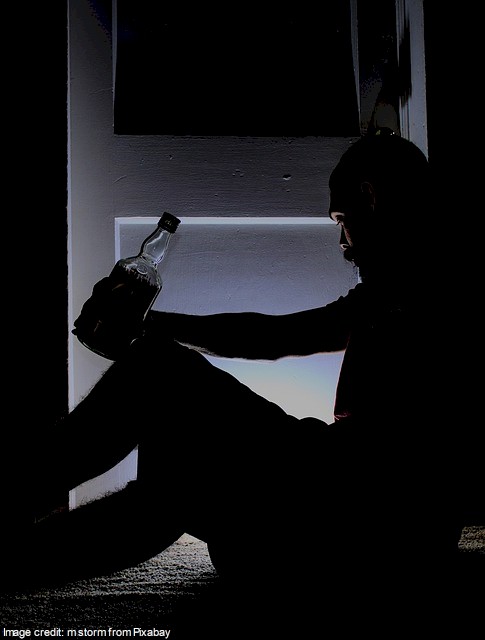
He opened the cupboard over the sink and fished down the bottle of vodka. The refrigerator gave up a carton of orange juice. He found a pack of magic markers in a drawer. He took the yellow one and, reading back through the letter, marked over her name. Yellow everywhere she existed.
The first vodka had disappeared – he made another. Now he seized the red marker and defaced each mention or insinuation of intimacy, of the whisper of two pale bodies tangled in a dark room. A third vodka and the black marker. He obliterated every I and My and Mine in the letter. With the brown he blotted out every promise and blue every compliment. Slapping the letter onto his cutting board, he pinned it to the wood with the boning knife.
Collapsing onto the stool, his forearms on the countertop, the glass corralled by the circle of his muscle and bone, he reached out and fiddled with the bank statement, the mortgage letter, the two personal letters. Why had he taken them? Meanness? Distraction?
He slit open the first. The bank statement was bleak, and the mortgage letter threatened, demanded the two missed payments. Maybe this couple was so poor he could pay them to kill Jeremy and have no bothersome questions, no shocked moral superiority. But to have Jeremy dead where he couldn't see it, feel it happen – no. Suffering welled up out of his hollowness – self-pitying tears sprang into his eyes. They dried salt on his face.
He followed with the personal letters. One was from a mother to a son. The letter had some anguish, not like his agony, but some. The Son was not to worry: his father would soon come around. No one could be angry forever. The money would soon be back and everything would be all right. In the meantime, Mother enclosed a check from her own account.
This would have been irritating if his heart had not been so broken – he wasn't going to destroy the check. Now he had to repair the envelope and return it to the mailbox. He teased open the second letter, just in case. Father had written it, in parade ground cadences. It directed the boy not to call, not to write, in fact, to never come home again. The Son was cut off, and if he didn't like it, maybe his prissy little boyfriend would support him.
Jeremy's arrival still hung waiting like storm clouds. Delay made the desperation mount. A couple of nights she didn't return home before his late rounds, but each morning he caught sight of her in the kitchen, still living alone. A snowstorm blew in and blew out – he left his tracks up and down the road, with a tracery of dog prints that laced through his in an arabesque of deceit.
The letters from the mortgage company turned more demanding. He witnessed a fight between the Son and the Prissy Boyfriend. The Boyfriend left and Son closed all the house blinds, stopped going out, seldom checked the mailbox. He understood the Son's need to hide shame and despair away. Darkness.
He felt too obvious in the road, even with the frequent changes in coats and hats. He needed another excuse, another alias. He picked up advertising fliers at the supermarket and, carrying a shopping bag, trudged up and down the road stuffing them into the mailboxes as he stole the mail, or returned it. He pawed through everyone's stuff, but only Two, Four, and Seven held any interest. The rest were a sea of dullness, unredeemed and mind-numbing. But not Neighbor Two – Two was hopeless, like him. After several notices, Two lost the nice car, not their junker. By chance he was loitering two houses away at a mailbox when two men drove up: one unlocked Two's car and stole it.
Neighbor Four trudged out to the mailbox to ask him not to stuff in the fliers. He already knew that her medical insurance had lapsed. Her son shuffled along by her side. Down's Syndrome. As they approached, he gazed down into the round face, the jowls, the limpid brown eyes behind bloodhound eyelids. If he had Down's like the child – now, Down's would be rough, but he wouldn't be lost in dreams of killing Jeremy.
Neighbor Seven, the Son, covered in a blanket, huddled in a chair in his living room and drank. Now the drapes were never drawn: the Son didn't care who knew. Maybe he should loan the Son the small revolver he had at home. Suicide wasn't so bad, if quick. But maybe murder was better. Maybe murder would make that upwelling of feeling, the anguish that he wasn't good enough for her – maybe killing would make that stop. For a moment.
He hated German cars. Parked out front in her drive, glimmering under the porch light, it spread its silver wings, flashed its Teutonic badge, waited for some sexy commercial to make. Jeremy.
He rang the bell, and after a moment the door pulled open. Jeremy was big: big shoulders, big nose, big hair. Jeremy gave him a hundred-watt smile and said, “Can I help you?”
“Is she here? I need to talk to her.” His hands were in his pockets, his right caressing the handle.
Jeremy was all charm. “No, I'm afraid that she's not available right now. Do you want to leave a message? Maybe I can help you?”
The knife was deep down in the pocket of his khakis. He could feel the point worming its way through the corner, pricking him in the leg. “I need to talk to her. Alone.”
Now Jeremy didn't look so pleasant. Concerned maybe. “And you are?”
Why wasn't Jeremy afraid? He should be afraid. “I'm the boyfriend.” The knife started to dance in his pocket. It was jabbing his thigh, wanting out.
Jeremy's eyebrows crawled up his face, nearly to the perfect hair. “Really?”
“Really.”
“I think you mean ex-boyfriend.” Jeremy's eyes went all squinty.
He took a step forward, his foot on the doorsill. “She'll talk to me. She still loves me.”
Jeremy put his hands both on the door and the jamb, building a wall across the opening. He was huge. “Listen, I don't know who you are, but I do know the guy she dated before me was Asian. I'm going to close the door now.”
He inched his foot forward. “Ask me in.”
Jeremy shook his head, frowning. “Get your foot out of the door, before I break it. I'm calling the police.”
He said, “Don't do this.” He knew his voice was too loud.
Jeremy swung the door towards the jamb, shoving on his foot. “ It's best if you go away and never come back. And I don't know what's wrong with your leg, but you're bleeding all over your pants.”
He dropped his head to see. Red soaked the thigh in a hand-sized patch. He rocked back, staring at his leg. Jeremy closed the door, without haste. The deadbolt snicked loud, final. The porch light turned off.
He faced up to it. She didn't live in her house anymore. Sure, she visited the house now and then to check on it and pick up the mail, but she lived elsewhere. With Jeremy. No sacred missives went out from her, no carnal notes arrived from Jeremy. He was as tormented by the loss of their cloying intimacy as he was relieved to avoid every flirting phrase. He had lost Jeremy's address – why had he been so careless? He could be there, where they were. Waiting outside.
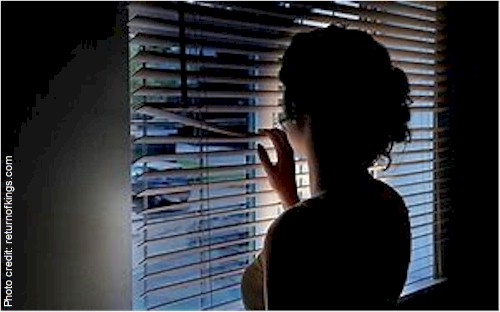
Neighbor Two received a threat from the Public Utility – power would soon be turned off. Neighbor Four's son had sinus infections – she was visibly upset. She tramped out to talk to him for no reason and mentioned he could start leaving the advertisements in her box again. Neighbor Seven, the Son, wrecked his car while drunk. The old woman with the terrier told him the boy wore a tracker on his ankle and couldn't leave his yard.
It came apart in only a week. On Tuesday the Son killed himself with pills, lying naked and alone in a bathtub. He was floating in stone cold water when they found him on Wednesday, but the anklet still worked. On Thursday the boy with Down's, angry over something, pushed his mother down the steps, breaking her wrist. On Saturday the bankrupt neighbors left in a rickety minivan, abandoning the house and all its things to the financial wolves.
On Monday a realtor stuck the sign in her lawn, struggling to get it into the frozen ground. The house was for sale.
He couldn't even remember her face. But he could remember how she had made him feel. How all of it had felt. He could remember how it was to be loved. It wouldn't quit rocketing around in his mind.
He tugged the boning knife out of the cutting board and made the first cut, an experiment, across his bicep. It hurt like hell and seeped a little blood, a drop running down into his elbow. Then he sliced the outside of his forearm, into skin she had once caressed. The two-inch long incision sprang out in bright red song.
By Naheed Brown
Just go and sit
Sit on his lap
He is a good man
He is from our village
Go sit on his lap
Don’t be rude
He is asking so nicely
Sit on his lap
I sit on his lap
I wince in pain
Startled, as I feel his finger
Slide through the side of my panties
And poke, dig, deep inside me
I sit on his lap
His wife offers me a sweet biscuit
And a cup of tea
Her face partly hidden
By the corner of her sari
I wince again
As his finger explores me
I try not to move
I sip my tea
Biscuit crumbs sprinkle
On my lap, leaving a sticky mess
I sit on his lap
His son laughs
A laugh that hurts my ears
His son asks for my hand and pulls open my fingers
He roars as he cracks my thumb
Pressing it between his forefinger and knuckles
Till it makes a sound
Pop! Pop! Pop!
He laughs showing off his teeth
Stained yellow from cigarettes
His beady eyes that matched his mother’s
Though hers always looked downwards
His father explores me
Digging deep into my womb
I sit on his lap
I jump ever so slightly
So that my six-year-old body
Will not rock the table
Or make the sweet tea spill
Staining the white tablecloth
Embroidered with red roses
Can we not visit them anymore please
I ask my parents
We visit them because
They are from our village
Don’t be rude, they are like family
I visit my village
My fifty-seven-year old body
Moving with the motion
The waves crash on the sides
As I sit on the boat’s lap
Soothing me gently
The dark river slithers
Like a long mysterious snake
And cormorants compete
For a tasty meal
While a lonely stork watches
There’s their house
His son lives there
Wheelchair bound
He cannot laugh or move
The parents’ graves are
Under the tamarind tree
Want to visit?
No thanks
I walk hurriedly past
The grey house overgrown with ivy
And smile as I see a mother
Holding her baby
Safely tucked in the nook
Of her waist
The corner of her sari
Hides part of her face
Don’t let her sit on his lap
I whisper
As she walks past me
Our eyes lock
We know not to visit
By Gerald Marchewka
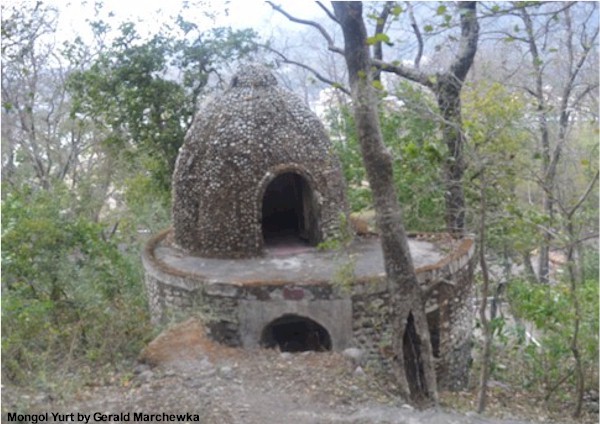
In ancient chariots, roamin truckstop divide, natural union, miraculous acrobat, pitstop coming, big girl, countless trammel, Hebrew with a backbeat Lincoln tunnel, beachfront property, four score seven years ago, John Kennedy, bad brains, Dallas Texas, Brookline Village Hillary Rodham, unlikely candidate, gary, mule, dear in fragments, efforts to redeem, a powerful slingshot, malignant tumor, cholesterol, grizzle, varicose veins, blocked artery, chicken pox, salad Ancestal vision, DNA replica, fertile crescent, buffalo river, bering strait, full metal, throat, chicken, hen, vodka, Iroquois continent, wrangling bombadier, whole wheat squadron, black lung tuberculosis, khar khorin, raisin, frozen destiny dried skin, fermented milk, outstretched hand, bloody, tramp, circulating stump, artificial limb, severed head, unsightly ghost, rhythm, toss pot, bedframe, quiver, freezing rain, blank hail, bullet, Kentucky stage fright, chitlin rascal, twiddling thumb, confedrate flag, fillet mignon, over the hills and on the trail, seabrook lamma, Tibetan fever Opium mandate, avian flu, whole children retribute, payback, sermon, sinister pelt, brooklyn shearing, french fur traitors, acadian hog, driftwood template, fabulous yurt, in back rooms, chimney top, blowing smoke, wounded men, ashes, dust, blood clot, urn, ragged dolls, elongated hair, agonizing eye, mystical heaven, blue sky, raven musk, sharpened stone, childbride, precious gem, red ruby, flailing, walt whitman, leaves of grass, destitute, sad old men, broken shard, bathing, clay born, raving mad, blue patina, gathering, arrowhead, silver, red dirt, yellow, oil can, cauldron, simmering, boiling, shrunken head, alarm pull back raise, contemptible gesture, burning flank, flaming abscess, aggravated sore, large repulsive attribute dangling, sheep stock, crescent cock, wailing, dripping, secreting scum, bold acrimony, bird’s nest, ambulatory evidence, locomotive train, sinuous rills, blind owl feather search, eyrie roost, lair, thresher and glenny, dapper dan, midnight silk, cashmere, wool cotton gin, bellowing creek, cufflink, yak, beaver. Still heaven, uncertainty, raging doubt, ramshackle, tweed, fresh fields, amber wheat, wholesale grain, bountiful rice, growing upward, cascading, downward, grand gifts, pulsating flesh, furrowed brow sweat, faithless heathen, benevolent throne, aching toes, footstool treason, strength, fortitude, latin, sugar, advancements, diabetes, insulin, recovery, truncated wisdom, bible belting, emasculated words, racial discrimination, feminist thought, human rights, traditional thinking, whereabouts unknown, floating, striking, selection band, recalcitrant, uphill hiking, moving mountains, innate, indigenous, tribal chief, innuit, pipeline, irkutsk, siberia, baikal lake, pristine, eskimo, local cuisine, russian borschst, placek, gwumpki, bar, pub, gin mill, tavern, tree, haven, sacred scar, udder, mare’s milk, stutter, walking, ambling, bringing it, all about, alcoholic shuffle, caviar, green tea, omsk, d.c., headway, postulate, romulan, back-break, tinker, rask, test-tube, green back, hip-hop, don’t stop, medovukha, novasibirsk, cold air cask, crimea, mealtime, trafficking, pleasure, strip shop, done, viking, kiev, plunder, left, traveling, poetry, suggestion, immolation, sacrifice, dunderhead, moses, carrot cake, gingerbread muse.

Resting, reclining, back seat, barrage, balcony, epithet, swear word, curse, stretch out, lie back, carriage head, pumpkin patch, briar thatch, brer rabbit, usher, shadow, dreamlike stage, hospital room, remus, renal failure, piss unseemly, ticket taker, lock, stock, barrel, smoking gun, scabbard, sheath, festering wound, infected sore, kris, blade knife, shaft, cerebrum, cerebellum, splattered, cum, viscous, salty, slimy, stained glass church, careful planning, pre-meditate, punk, incense, jack o’ lantern seed, serrated tooth, black thing, hemline proper, pitter, patter, open sesame, kiosk, sputnik razor, edge, living, dreadful ending, five-o’clock nibble, slick, tidbit, nipple, torn, squashed, cavern club incisor, pussy, national morning, obscene, pall bearer, weeping, finite, cough in, sad, mournful mariah, elijah blue, motherfucker, deep south, cracker, white trash, whip, cookies and cream, genocide, jello, John Wilkes Booth, kiosk, stand, over the counter, opiod, addiction, bookstall, rifle, open space murder, destroy, annihilate, taki horse hijack, rope up, slip up, gordian knot, oakgrove, sour cream, chive, old orchard dive, big joint, drop down, jive, vanilla, serial, episode, ratings, plummet, graveyard, tombstone, inch, defecate, gaza, crawl, slither, fake, bung hole surface, summit, state of the union address, stream, maslo, cricket, kernel, fly, medicinal purpose, separate, labyrinth, mudslide, puzzle, confuse, cover-up, dementia, gray matter, abstentia, high-tide manila, envelope, cebu, tawi-tawi, cardigan, lapu-lapu, striped shirt, sistine chapel, graphic fire, ardour, time warp treason, civil war, chinggis, khan, jamkhun, fightback, saddle, shrapnel, lesion, gash, sword, sexual deviation, glad bag, rag, steamed trout, reasonably safe, underwood, projection, holy fish net, stockings, garter belt, smash, punch, bedtime, blanket, sleepless night, ineffective tripe, stomach ulcer, mole, cancer, snipe, wart, mugwort, philosopher, callus, rotten fish, smoldering, speaking, covering, tendrils, artificial, ripe bananna, sleet, apple daiquiri , hidden parts, slit skirt, amnesia, shocked, little kid, hebron, gaping nerve gas, popper, thunder, rush, spark, kindle wood, crepe, national crisis, briolette, bagpipe, newton highland, rumpled suit, carolina mind, abridged edition, storyville, market, new orleans, new deal, reconstruction, bathroom, grim reaper, magazine, bullets, mary todd, sugar, chain, franchise, daisy, gang, plank, edward, baker, wooden teeth, washer, candlestick, wax, maker, menorah, free mason, solitary, season, orthodox jew, celebrate, sitting, confederate, general, blackwater, border, julius, howell, cessation, grant, lee, st. petersburgh, furlough, virginia, saturday night, turmoil, bad breaks, big, habits, curious boy, flag pole rising, half past, chopin, padrewski, lincoln, shot, southern, soldier, demented, brain, state’s rights, centepede, public, living, john, brown, brutality, negro, children, south africa, presidential chair, more men, naturally, cavalry, infantry, spring, regiment, blue, invasion, babbling, brook, fork tongue, prelude, secure, substitue, st. paul, church, woman, congregation, davis, sheridan, resident, pandemonium, face, dance, warrior, yankee, dead, fell in, hanibal, federal soldier, hence, freedom, preservation, land rights, urban, rural atrophy, encroachment, horse, thief, weaponry, maximilian, shelter, hapsburgh, lorraine, clapboard, country, joseph, maria, shanty, billowing, cloud birth, quintessential, rain, dog, stygian, haggard, slim, bayonet, fresh dumplings, handgun, cadet, sword, carnivore, raising caine, colt, rivulet, vagrant, robin, homeless, ward, tile, revolver, footprint, moccasin, sneaker, silent street, football, remington, moore, picture, glass, nigerian folklore, west african, trade, book, shop, newsstand, piedmont, mississipi, burning, ojibwe, algonquin, mizi-ziibi, messipi, river boat queen, dyke, pawn, destiny, history, victory, third world, reparation, poetry, bread, art, charleston, massacre, dirty lampshades, truncated suffering, memories, survive, cold repetition, soviet counsel, flattened imagery, shapeless circle, blow, gun, poison, amazon entry, lasting, forest, treetop, ashram, communal, sequence, fade, away, kibbutz, kaddish, empathy, mennonite, jesus, pennsylvania, a la turk.
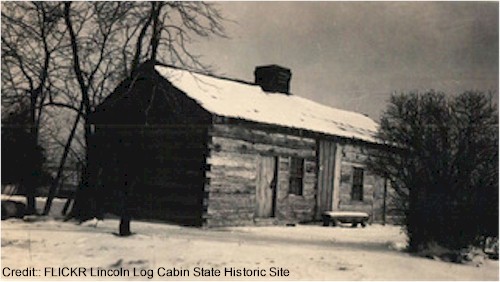
Oh Genghis! ancient ruler, beacon, spirit world, brother, sister, blind alibi, taken, given, dormant, mellow, playing, morin khur, soft, string, vibration, open, arms, hands, salutory, greeting, lunar, white, solstice, gray, sky, blue, beard, river, dome, fountain, stone, pristine, water, sacrificial, bird, livestock, sheep, best breeding, herders, shepherds, wayward, flock, salty, milk, oily, tea, erratic light, ambling, spindle, sticks, shining, longer, dark, winter, mornings, fever, eclipse, mutton, ax, sheltered, heathen, surprise, red deer, wonder, heated, scape, pointed, shoes, sacred, ritual, blowing fire, wrestled, head, lock, noble key, descendents, khitan, xiongnu, tuoba, goturks, merkits, hun, meandering, riding, silk, road, fine fashion, robbers, gansters, import, tax, forgiveness, broken, baby, swadling, rosy, high cheek, gobi, sand, inebriating, icy, cold, wind, hawk, barter, local, market, destabilizing, fight, blood, bath, rattling, saber, tang dynasty, uyghur, vertical script, meat, soup, bone, children play, five, manly, games, ramrod, scuffle, cool, celebration, hand, job, empathy, snow, ancestral, fire, reverberating, cess, pool, naked, theater, sergei, badorov, buriad, blew, red mascarra, overlap, frozen glacier, disappearing, act, khovsgol lake, traveling mecca, almaty, wake, kazak, culture, rippling muscle, muslim fortress, patriotic emblem, venal sculpture, molten steel, flame broiled, chicken, mongol, tradition, blood clot, urn, bedtime, coal, earthbound, silver, mineral, copper, gold, teeth, russian, taiga, flights, chita, tuva, mainstream, counter, part, adversary, trip, nimrod, conquest, industrialist, aftermath, precious metals, polar city, bear north, brazen wolf, heavy breathing, norilsk, comprehensive, development, alchemy, arctic, territories, extreme, sports, woolen, complex, geometric square, meeting place, yuletide, deposition, frank, exposure, diplomatic, testube, barren, landscape, snow, scaped, leopard, skin, pelt, high heeled, leather boots, walking, mindset, artic circle, unforgiving, dream, forced labor, gulag, camp, strategic, energy, military plan, shipping distance, international, traffic, human habitation, extensive, spatial, recovery, indigenous, plants, mines, railways, unlikely force, stolen, land, nautical, miles, magnet, migrant, tev tengr, acid rain, horizon, hidden, skeleton, archaeological find, fool, hardy, semen, winter, day, swimming, frost bite, pension, technique, speed, stamina, seafaring, civilian port, gulfstream, weather, low income, four children, fish factory, empire, ogedei, trustworthy son, stuffed, dumpling, fatty, food, pierogi, beef, slavic cuisine, estonia, latvia, lithuania, schrod, tundra, reindeer, sled, breeding, horse, sparse forest, khublai, chabi, beijing, buddhist, yuan, phags pa, lamma, sutra, prayer, plant, invocation, doggie, dash, stud, litany, grace, elegance, refinement, savoir-faire, cop, constable, crushed stone, hard work, transported goods, motley crew, atomic fleet, reactor, off-duty, police officer, real, lenin, savannah, moon, ice surfer, sail, one bladed race, london, buck, wheat, manor, sacramento, sami, salami, lapland, behavior, fortunate, destiny, frequent, fighting, sailor, little hail, sleet, slush, hohot, mao, sad, city, depressed, erlian, crossing street, ethnic, minority, han, bogd khan, recourse, requisition, solicitation, roman, von, ungern- sternberg, anti-bolshevik, jewish pogrom, manchurian, qing, descending, jurchen, queue, hell, harlot, barber, bangs, shots, bar stool, slots, wheeling, west virginia, appalachian, union, lore, referendum 1861, shenandoah, scene, stonewall, ferry, harper, jackson, rail, emancipation, proclaim, freedom, ring, diamond, coal, black, mine, canary, yellow, marsh, street, school, rise up, sunny town, shady place, penny arcade, woolworth, parade, ice cream, dream, milk, sugar, chocolate, hershey, candy, banana, sundae, syrup, float, spoon, sprinkle, rural, south, strong, brave, ressurection, scheme, sycamore, maple, chestnut, squirrel, chinese, elm, blue spruce, mountain pine, duquesne light, pennsylvania, dutch, monongahela, dairy town, elk, river camp, allegheny mountain, leaf, springtime, flower, wild geranium, bluebell virginia, jack-in the pulpit, one-room school house, picket fence, green-grass, clover, shamrock, fairy, suburban lawn, four wheel drive.
By Nastashia Minto
I am the dealer of this hand but I forgot to deal myself in.
The sun slithered across my flat bare chest as sweat collected on my body like raindrops. The smell of ferns and dry leaves crumbled under my half naked body. The gritty feel of the moist dirt. The loud chirps of the birds and the deep croaks of the male frogs. Those feelings those sounds, and the stickiness from the hot humid air will forever be engrained in my skin and in my nostril; as I laid on my back waiting for his twelve-year-old body to get on top of me. We grind our small body parts together. Our shirts were off but out pants stayed on we call it “haunching” where I’m from. Neither one of us knew how to kiss but somehow we made awkward motions towards each other’s lips. He has full lips but his breath is stale and blends with the air around me engulfing my skin. He rubs the little knots I have on my chest as breast and I liked the way this new feeling made me feel. My ten-year-old body craved something that the mouth couldn’t explain and the heart couldn’t explore. Was it love? Was it acceptance? Was it touch? Was it all three? Maybe my heart desired to be touched in ways that my body had never known. I knew I couldn’t explore the depths of these feelings especially not after getting my menstrual cycle at the age of nine and being told I was now a “young woman”. The only thing I had seen come from “young women” were babies.
I was a face card and a seven of hearts and I had broken the cycle of not getting pregnant at the age of fifteen. I knew that my friend’s dad and mom checked me out often and I liked it. We made comments about how we would sleep with each other if the time was ever right, but the time just never seemed to be right. Early May days in Georgia are just the right temperature. Hot, but not too hot. Sticky, but not too sticky. Swimming parties, bright lights, chlorine-filled pool, BBQ chicken on the grill and tequila swirled around in the air. Until this point I had only drunk with my mama and my best friend. I didn’t know my limits. I didn’t know my body had limits. We took shot after shot. One, three, five, and seven. Seven I stopped at seven. We are Fifteen, sixteen, seventeen-year-olds with two thirty-six-year old adults throwing the shots back. My seventeen-year-old body had only known sweat, torn ACLs and ruptured ovarian cyst. But with forgettable amounts of tequila shots my seventeen-year-old body’s mind became clouded and staggered to find a place to lay down without drowning myself in the pool. His thirty-six-year old body found me lying on one of the twin bed in this tiny bedroom. His thirty-six-year old body could handle more. Knew more. But couldn’t care less. We were surrounded by pink walls two twin beds and college softball posters. He leaned in to kiss me.
“Where is your wife”? I said. He said, “Don’t worry about her, she’ll join the next time”.
I became a little excited that he said there would be a next time because I was more attracted to the wife than him. He kissed me again. He saw in my eyes that I didn’t know what to do. That my body was filled out and aged like a grown woman, but between my legs had never been touched. So, he said, “Get on your knees and I’ll tell you what to do”. He gave me instructions on how to suck his flaccid dick. I had never done that before and I would never do it again. I was immediately filled with shame and regret. Shame from the act that I performed and regret because he was a married man. But I couldn’t stop I had to keep going to finish what I started. I had to know if that feeling that I was searching for was at the end of that moment. But it wasn’t. I wondered if my seventeen-year-old body craved the same type of touch as my ten-year-old body did years ago.
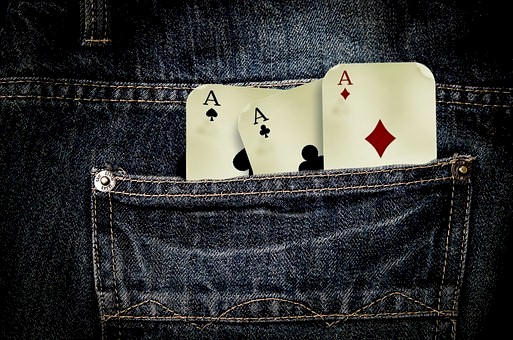
The shame and regret of this act and many other actions lingered in my body for at least 20 years of my life and I searched after a feeling that I thought would fill me up and satiate the thirst. The feeling that went beyond any physical aspects. The feeling that swaddled me with no expectations. In the midst of rearranging the deck of cards I realized I was seeking for my mother’s and family’s love. I sought after it in my friendships and relationships and I was always left unsatisfied, unfulfilled and felt unwanted. I was let down due to my own expectations of how I thought they should love me. Why couldn’t these friends and partners be the wild card in this shitty-ass hand I was given. Why couldn’t I leave an unhealthy relationship with a woman of five years on and off. I wanted to believe she loved me. That the years we spent together were not just wasted time, because they weren’t. I guess we both loved the idea of what we could be together and ignored the reality of what we were together. A trauma-filled relationship with no boundaries and high levels of validation required from each other. I felt I was never allowed to be fully vulnerable, completely “Naked” because she couldn’t handle my big emotions, and she wasn’t allowed to be herself, but I didn’t know how to contain her rage. So, I tucked my heart away so that my tears didn’t desire the need to express themselves. Rest themselves on this beautiful brown skin. Even now I have the hardest time with crying, because my tears are so used to being held in.
In this span of continuously reshuffling the old deck of cards I decided to buy a new deck and many expressions seeped through every pore on my skin. My heart thudded louder – lub-dub, lub-dub - because I decided to deal myself in. I changed the game. I decided to play solitary. I strategically set myself up to win. I am my own wild card which allows me to release my mom, my family, my ex and all the things I expected for them to be. I realized that people can only go as far as their depths go, everything else are expectations placed on them from me.
I’ve looked back at that ten-year-old child who desired the touch, the love, the long swaddles and I hold her, I speak kindly to her. I lay sweet kisses on her forehead. I remind her of herself, of her beauty and the things she will be. I sit with that seventeen-year-old as she lays her head on my shoulder and I allow her to release her fears and shames within me. Then, I look at this twenty-eight-year-old and I see how far I have come. I see the beautiful boundaries I have set for myself. I see how far I’ve grown in self-love, self-esteem and confidence. There are still times when I battle with myself in my own games. The negative chatter in my brain with the invisible rules of this game as a wild card. A card that was meant to be disregarded but somehow continuously shows up throughout the deck. I kindly remind myself that I am the dealer of this hand and I will always get the first cards to deal myself in.
By Mary Ellen Gambutti
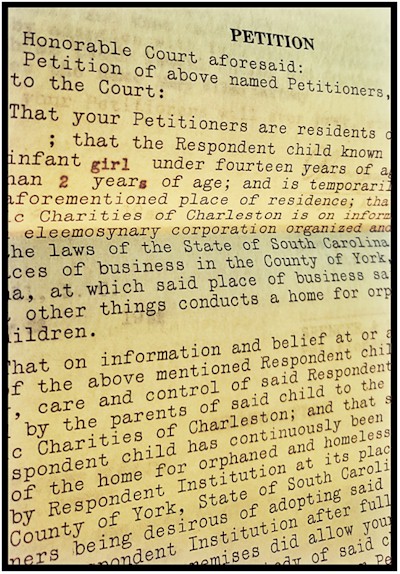
Not Present - Present
Petitioners and Respondent not present in Rock Hill Court of Common Pleas, York County, South Carolina, October 20, 1952. Prospective adoptive parent Petitioners not present for hearing. They and infant child Respondent stay home in Sumter. Although a big day for Petitioners, they don’t travel ninety miles, this time. Present at hearing held at Spencer Law Offices the law offices of Petitioners’ lawyer, are Referee, Clerk, Petitioner’s lawyer, lawyer for and Director Reverend Father S. of Catholic Charities Agency, as well as Sister Matthias Guardian ad Litem for an infant child known as Ruth Ann Respondent. At close of proceedings infant child is transferred into sole custody and care of the Petitioners--she already is in their Sumter home. Prior to court date Petitioner Al and Agnes C. tendered infant child’s new name to Catholic Charities Agency in writing where it was entered into record and imprinted on the gilt-edged Certificate of Baptism and Birth. At close of hearing the child’s name is changed to Mary Ellen C. from Ruth Ann. Adoption finalized. Papers all signed and exchanged through U.S. mail. Final bulk of onion skin in manila envelope accompanied gilt-edged Certificate of Baptism and Birth transferred to new parents. Sealed from all parties in adoption—the child’s Original Birth Certificate.
A System
Hand-written typed intrastate interstate instructions character references health and educational history genealogical guesses by adoptive parents payments by check payments transferred through seven month fostering period. Regular progress reports photos of darling baby girl sent to Charleston Catholic
Charities Agency demonstrate baby’s wellness and prospective parents’ suitability. Home visits ensure Agency baby in good hands. You see, South Carolina had a system for poor mothers mothers who waited tables in bars where servicemen stopped mothers who worked in textile mills like Conestee Poe Pendleton Monaghan carders bobbin winders mothers who lived in mill villages along rail tracks near mill dam waterfalls in shabby saltbox shanties with their sharecropper or millworker daddies mothers whose pay was servile or non-existent. South Carolina had a system for poor mothers maybe unwed or just dirt poor and social workers encouraged mothers Catholic Charities could find babies good homes--ok to give their babies up. A system now known as “Baby Scoop Era” among today’s adoption community. Another couple would want a baby. Don’t worry. And the system was seamless. Agency church hospital mission infant home doctor whose name is stamped on masses of records they all worked together for the common good.
A Catholic military couple might be chosen and that was good. Even if it meant much shifting and shuffling down the road many transfers 1) birth and surrender to nuns 2) transfer to Infant Home 3) Agnes and Al’s Sumter apartment 4) New York 5) Ohio 6) New York 7) New Jersey 8) Texas 9) Louisiana 10) Tokyo 11) New Jersey…These children would be grateful and happy, there would be steady income best upbringing education good schools nice clothes plenty of food and doctors maybe an adopted sibling. Opportunities where none existed.
Surrender and Falsification
My mother Leila named me Ruth Ann. Certificate of Birth and Baptism is a falsified record as adoptee records often are. I’m not born in Rock Hill as Mary Ellen C., but in Greenville St. Francis Hospital, as Ruth Ann. My birth mother Leila told me when we reunited a year before she died at 67 she gave me to
hospital nuns to take good care of me. I’ve never seen the paper she signed. It might be under seal with my original birth certificate on microfiche roll in Catholic Charities Agency or in Columbia State Capital with my birth family’s identifying information. Here is surrender as read to court by Sister Matthias:
The party of the first part hereby gives and grants the party of the second part the full and complete custody, management, care and control during its minority, together with the full and complete right and power as one in loco parentis to provide for and consummate the adoption of said child by such person or persons as in the sole discretion of the party of the second part it may deem proper for the best interests and welfare of said child.
I Baptize Thee
I bet I was baptized before a Franciscan Sister or social worker drove me swaddled in a car bed, my barely-opened eyes squinting to flashes of fall morning sunlight through a glimmer of roadside trees eastward from Greenville to Rock Hill Upcountry, the Saluda Mountains of the Blue Ridge off to our left to Rock Hill Philips Mercy Infant Home. The Sisters fussed over me carried me up to my new home my new home my crib to be an inmate in custody of Catholic Charities’ affiliated infant home until a good couple would foster baby Ruth Ann five months later. Sister Matthias would have asked the couple “What will you call her?” And they wouldn’t have hesitated, “Mary Ellen.” Agnes and Al began to call me Mary Ellen that day they drove me ninety miles to Sumter from Rock Hill infant home that snowy February 27th. Or maybe a St. Anne’s parish priest walked next door to St. Philip’s Infant Home and Sister Matthias greeted him at the door. Together, they might have climbed one story in the narrow stairwell one story to a sunny green freshly-painted nursery that late September day. He might have performed the rite, softly trickled holy water on my infant head, quietly, softly, Ruth Ann, no sir-name. When a good couple came to foster me five months later, Sister Matthias would have asked the couple, “What will you call her?” Without hesitation it would be “Mary Ellen.” That moment Agnes and Al fell in love with me they changed my name changed me to their own. At that moment I was changed to “Mary Ellen.”
Until that snowy day February 27, 1952 I was Ruth Ann. I breathed and grew in my upstairs nursery crib. My wide-awake brown eyes would follow swaying branches of tall oak across the winter window pane. Maybe I cried when other infants cried. Maybe Sister rocked me with a bottle, or propped the bottle against a rolled blanket in my crib. Fed me formula in sterilized bottles, a concoction of evaporated milk, egg and corn syrup, later a mix of Pablum and milk-wheat, oatmeal, corn meal, bone meal, brewer’s yeast, and reduced iron to keep me strong.
I shared nursery space with at least one boy baby a baby boy my adoptive father recollected as “Michael.” When I was six, after dad told me a made-up adoption tale, he admitted he wanted a boy wanted to bring Michael home. But Mom wanted a girl, he said. It made me sad Michael was left behind. Could Michael have been the baby boy also adopted by a military couple, also born in St. Francis Hospital September 1951? My chance meeting sixty-five years later this new lifetime a new friend named Joe—might he have been Michael?
Identity Confusion
I wondered disbelieved the story of my mother my family my people dead began to notice something missing. Told there is no one I wonder then is the real me, Mary Ellen? Or is there another layer of undiscovered me an under-layer under the surface of me. My face my arms my legs are they mine are they like yours? How I walk how I talk are different. How I look in the mirror is nothing like them yet they are mine I am theirs. They must they have to be mine otherwise there is no one. Dad is Irish then I must be. Because I even look a little like Dad, they said, doesn’t she? But I don’t see it just smile just pretend. I don’t see anything of Mom and Dad in me in the mirror. The aunts, uncles say how cute, she looks like her Daddy!She looks like Al!
Persistence
They changed me to Mary Ellen and kept trying to change me until they could no more. Even the hand the belt couldn’t change me make me someone else. To re-birth me to make me theirs alone someone they could be proud of the child they wanted but could not have. As much as they loved the infant they could not make me their own. Didn’t have the power to make me fit. If I tell you how they tried to change me form me into their image, denied my origin. When I didn’t know my origin they said I never would never could. They didn’t know my origin. Feared something they couldn’t understand. Someone they couldn’t approve of. Someone could be what I might become. They must have thought the shame of me my origin the shame of Ruth Ann someone they couldn’t approve. They might have tried but couldn’t understand couldn’t know me. But they used their fear of my origin of who I am like a slap a denial. They used it on account of behavior diligence perfection potential. I couldn’t speak to this disconnect--couldn’t bring it up--but he would bring it up when I was a problem. I saw him mourn the child he couldn’t have. He couldn’t say if you couldonlybe someone like the angel child that blessed them. That they couldn’t conceive. And it devastated me because I wasn’t that baby anymore. When I grew and became myself, it wasn’t that infant he used to have. I didn’t fit.
A Different Version
My name is a new version of a name--a version of a woman’s name whom I could not know--another version. Ellen Mary was my father’s mother whom I would never know. An image of an Edwardian woman with hair piled up, long skirt, cuffs, white tight bodice and cameo pin. A woman framed in filigree on my dad’s dresser didn’t smile. I didn’t know her in a fancy metal frame. An image I could not replace with one of my birth mother because there was no image--none in my mind none on my dresser maybe no one’s dresser. Never to be mentioned--Leila. A woman whose name I didn’t know.
When I learn about my birth mother she’s something like me not what I’ve become. I hug her, battered old sick sad, the age I now am, sixty-seven. A woman I might have become never was, except underneath in my under-layers. And yes it is because my parents changed my name had the power to change my life. Leila couldn’t she couldn’t try or didn’t want to, so my parents changed my name changed me--my life. They removed whom I would have been whom I might have been. They did all they could to deny all about me except for their own expectations. Whom might I have been? The Agency advised them: deny that self. Best to say there was no one. I had no one but I had a feeling.
Afterwords
I learned much when I was forty, when my search for family of origin found my living mother. I met her and learned her sister’s name was Ann, her brother’s wife is Ruth. Double names were popular–Ruth Ann, Mary Lou, Mary Beth, Mary Jo, Sue Beth, Peggy Sue–1950s names. Ruth Ann, Mary Ellen from Ellen Mary. Old-fashioned simple names, not a simple girl. A child born and surrendered in haste bourne, boundaried, burdened by adoption. Why wasn’t there a post-adoption baptism, I wonder?
A do-over, a make-over ceremony so my parents could see me redeemed from a life of poverty and shame. So they could witness my freedom from Purgatory’s cold fire, where lost babies go.
By F.I. Goldhaber
Protest
Reverend George registered to vote.
Linda just wanted to walk to school.
Medgar applied to attend law school.
Rosa took a seat and would not budge.
Ezell, Franklin, Joseph, and David
insisted on the right to buy lunch.
Martin spoke about a dream he had.
John's dedication spans five decades.
Colin knelt during national anthems.
All these African American
men, women, and children angered whites
who refused to respect them and to
accept their equality; denied
them their dignity and civil rights.
Some paid with their lives, some only jail.
All suffered scorn and rebuke because
they chose to protest injustice;
speak against systemic racism.
Forgotten
Fire sweeps across the west, Drought parches farmland from Seas rise, encroaching on Storms tear through our cities Yet still those in power |
At best they'll blame nature, They refute the data, And so we've reached the point The planet will continue All that we've taken, we've |
Ugly But Necessary
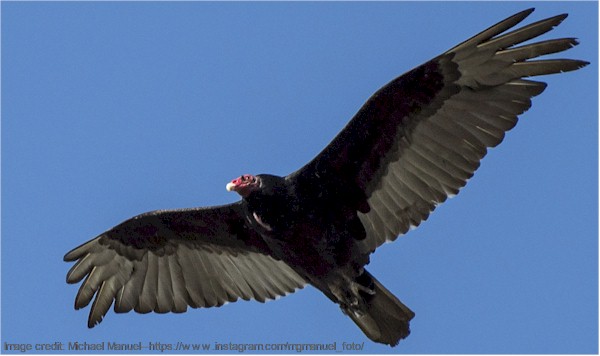
From the air, your impressive wingspan allows
you to be mistaken for a hawk or an
eagle. But once you land in the swath of green
wetlands that slashes through suburban condos,
your bald head and red, pebbled dermis makes it
impossible to confuse you for any
majestic raptor. Still, when you alight to
clean up the carcass left behind by some of
the more exalted members of the Order
Accipitridae you prove how, though you are
unappreciated, you're necessary
to the unending cycle of life and death.
By William A. Carpenter
I couldn’t ask about the cigarette burns.
Do cigarette burns on tatami mats express “wabi-sabi,” the Japanese aesthetic sensibility that finds beauty in the imperfect, impermanent, and incomplete? What if the tatami mats are in the tea house at the Portland Japanese Gardens?
Wabi-sabi is at the heart of the Japanese tea ceremony, a highly ritualized activity that uses handmade tea caddies, bamboo whisks and scoops, and tea bowls with small imperfections that are seen as much more beautiful than perfect mass-produced utensils.
I never expected to be in the teahouse at the Japanese Gardens. I had looked at it from the outside for years when I visited the gardens. The gardens are a place of meditative quietness, a liminal space between the urban city and nature. I had studied the Japanese tea ceremony for a couple of years at a private home. But I never imagined attending one in the teahouse at the Japanese Gardens – and certainly not as the chief guest. My class had been invited by the instructor as a graduation exercise. I was chosen to be the chief guest only because I had occasionally given the instructor a ride home after the weekly class.
In the tea ceremony, everyone has a role with specific duties and restrictions. As guests, you enter the tea room in the right order, sit at the right place, and make the appropriate responses at the right times. There is even a set of ritual questions that the chief guest asks the tea host in a ritual that is hundreds of years old. The questions are prescribed, but at least we were allowed to use English.
This degree of ritualization requires a lot of training and concentration. If I thought the role of chief guest was difficult, it was as nothing compared to the protocol and duties of the tea host, who had to observe the ritual correctly while producing bowl after bowl of tea made just so, in a ceremony that lasts hours. Yet there is something oddly freeing about having everything prescribed – or at least it is after you have practiced the ceremony for years. Once mastered, you no longer have to worry about what you will say and do.

The ceremony was beautiful that afternoon. We gathered and sat outside the tea house in the covered waiting area. We entered one at a time down the stone path, through the gate, and paused at the water basin to ritually wash our hands and rinse our mouths with water scooped from a stone basin. Then we entered and kneeled on the tatami reed mats on the floor of the tea house. It was made of wood and the timbers were visible, including those in the alcove in which an old scroll of brushed calligraphy was displayed. A light breeze caused the leaves in the trees outside to sway, making lovely patterns in the sunlight that came through the shogi screens. One post in the alcove was purposefully just a little too short to reach the floor, an imperfection that emphasized the careful craftsmanship of the rest of the room – another touch of wabi-sabi. The gentle sound of the water heating over the charcoal brazier was like minimalist music. The tea utensils and the tea bowl were set-out in their proper places near the instructor.
The tea itself was just right. A frothy bright mix of bamboo-whisked powdered green tea and hot water that tasted both clean and caffeine-bitter. The instructor ritually rinsed the tea bowl between each use and wiped it with the appropriate cloth in the prescribed way – turning the bowl exactly 3 ½ times for wiping the outside and twice for wiping the inside. Each guest in order drank a bowl of tea, following the steps of the ritual which included bows and turning the tea bowl one quarter turn before sipping from it.
The only discordant note was all the cigarette burns in the tatami mats on the floor. There were dozens of them. I wanted to ask about them, but questions about cigarette burns are not one of the standard questions you can ask at a tea ceremony. You can ask about the history of the tea bowl, or the tea caddy, or the scroll, but you do not ask about cigarette burns.
The tea ceremony itself went well. The instructor was an expert and we guests had just enough training to avoid the worst errors. We bowed in the right places and I managed to ask the appropriate questions at the right time. I was surprised that the tea bowl, a rather plain raku-fired brown bowl with a rough exterior, was over 100 years old. And although we guests made some mistakes – decades later I’m still embarrassed that I presented the guests’ gift to the instructor at the wrong time – nothing marred the essential beauty of the ritual.
The teacher closed the ceremony and then invited us to relax, which gave our knees a welcome break from the standard Japanese kneeling position. After some general conversation, I finally had the chance to ask about the cigarette burns. She told us that someone was breaking into the tea house late at night and using it as a place to sleep out of the wet weather. Whoever it was smoked and was not good about extinguishing the cigarettes. The Japanese Gardens had guards and dogs patrolling at night, but no one had been able to figure out how the intruder entered the fenced grounds and then the tea house, which was kept locked.
I recognized that the Japanese Gardens had become a sacred space for me during the tea ceremony and I reacted to the cigarette smoker’s intrusion as a desecration. It was years later, when I read a book about an old-fashioned Japanese inn that carefully avoided remodeling its own imperfections to suit their modern clientele, that I suddenly realized that the cigarette burns were just another example of wabi-sabi. Those burns, like my own imperfect performance as chief guest, helped to emphasize the ideal order and beauty that I had found that afternoon in the Japanese tea house.
The evolution of culture is ultimately determined by the amount of love, understanding and freedom experienced by its children... Every abandonment, every betrayal, every hateful act towards children returns tenfold a few decades later upon the historical stage, while every empathic act that helps a child become what he or she wants to become, every expression of love toward children heals society and moves it in unexpected, wondrous new directions. —Lloyd deMause An American social thinker known for his work in the field of psychohistory, Lloyd deMause is a lay psychoanalyst and founder of The Journal of Psychohistory. This quote is from his work, “The History of Child Abuse” which appeared in The Journal of Psychohistory Vol. 25, No. 3, Winter 1998. |
| Spotlight |
Spotlight on: Child Marriage
By Dawn Tyree
A simple Internet search reveals the shocking truth about child marriage in the U.S. While you might imagine that child marriage would be more common in developing countries, perhaps you do not know that it is legal and not uncommon in progressive nations like the United States.
In 1985 at the age of 13, I was forced to marry a 32-year-old man. He was a family friend who had been sexually abusing me since I was 11 and when I became pregnant by him, the trusted adults in my life told me that it was in our best interests to marry. By their reasoning, the marriage certificate saved the family friend from a prison sentence for child sexual abuse; and, it saved my parents from child neglect and child endangerment charges.
After three years and with two small children in tow, I got out of the marriage. Many child brides do not find their way out, however. Once they are forced into marriage, they are stuck in it without any rights or access to resources. They are old enough to marry, have sex, give birth, and yet too young to get a divorce. They are too young to go into contract with a lawyer, sign a lease for an apartment, or even worse, too young to go to a woman's shelter. You see, the shelter has no choice but to turn away young girls because the law considers them minors and runaways, and therefore liabilities to the shelter.
Between the years 2000-2010, in the US alone, a quarter of a million young girls – some as young as 12 years old - were forced into marriage - mostly, to adult men. Some states have no minimum age requirement. The state of California does not even keep data on these marriages. After lobbying for changes in California and requesting that the state at least track the data, every attempt was thwarted and totally defeated.
The non-profit organization, Unchained at Last, is leading efforts in the nation to change laws and close the loopholes that put young girls at risk. As we bring awareness to the public, legislators are beginning to listen. In 2018, Delaware and New Jersey were the first two states to close the loopholes that allowed child marriage. These states set the minimum marriage age to 18 years old with no exceptions. Two down, 48 states to go!
In December 2018, Unchained at Last partnered with Equality Now to launch a new coalition to shut down the statutory rape exemption at the federal level and address the immigration issues of minors petitioning for spouses overseas and vice versa.
A recent UNICEF USA report revealed that almost 9,000 underage children were married in the U.S. between 2007-2017. These were petitions for foreign spouses. Girls were overwhelmingly the younger party; 95% of these marriages consisted of an older man marrying an underage girl.
In April 2019, journalist Elizabeth Vargas with A & E Network featured a two-hour documentary “I was a Child Bride: The Untold Story, on child marriage in the U.S., which is available on Amazon Prime and YouTube.
You can join this mission to establish the rights of young girls in every state and end this human rights abuse. If you or someone you know is being forced into marriage, or is already trapped in a forced marriage please contact:
Support Resources
National Coalition to End Child Marriage in the US
The National Domestic Violence Hotline
| Creative Non-Fiction: Vignette |
Slice of Life: Love and Betrayal
By Prisoner 53.3.8.5.7
It was a good day. A visiting day. The sixth of August, two days from the second anniversary of when we first started dating.
My plastic sandals clipped and clopped as I followed the round guard down the sterile, stark white, echoing hallway. I looked up almost mesmerized by the view through the skylights above. Through the bars and glass and rusty barb wire, I could see a nice, blindingly cloudy Pacific Northwest morning. I smiled when I heard the faintest sound of rain.
Clipping and clopping to an ungraceful halt I nearly bumped into the guard as he stopped in front of a door marked "VISITING ROOM #1" in all caps. He shot me a dirty glare and unlocked the bolt with a loud sliding clank. As he pulled open the thick metal door, I could see my Dad and my girlfriend standing on the opposite side of the thick glass shifting awkwardly from foot to foot. Both smiled only slightly when they saw me and a pit formed in my stomach when I saw that each one was teary eyed.
I smiled, happy to see them, and sat down on the cold metal stool. She reached for the phone receiver and held it up to her face as she pressed her hand against the glass. I picked up a phone and put it to my ear as I pressed my hand as close to hers as I could. I studied the way the color of her eyes swirled in deep brown and greedily took in her presence.
She smiled and choked out, "Hey you," in a small, painful way that sent a hairline crack through my heart.
I half-smiled, "Hey baby..."
"She wants to talk to you, son,” my dad said quietly. “I just came to be here for you, but I'll give you guys some privacy."
"Okay..." my voice trailed off and I saw the fatigue in his face as he hung up his phone.
"Baby?" she said drawing back my attention. "I love you..."
"I love you," I interrupted, saying it the way she liked, without the "too" because she always said it felt forced that way.
A faint smile touched her lips then died. She continued, “...but I think we should take a break."
I looked from her to my dad who was staring at me before looking down at his hands. I turned back to look at this woman I loved. "A break?" I asked.
"Yeah," she said staring at me. I could feel tears beginning to blur my vision. I looked down at our hands pressed against the glass. Less than an inch away, so close and yet so incredibly far.
My thoughts began to race. She hasn't been answering most of my calls lately. She said she went camping with her uncle and there were boat problems... she's told me that story before, right? Back in high school when we first started dating, right? Same with that time she wasn't answering the phone, then told me she had to drive her dad to the hospital because of a gross, stinky blister on his foot...right? I lifted my eyes and saw her favorite starry, olive green shirt, then the neck I loved to kiss, her pointy jawline, her wet cheeks, and finally her overflowing eyes.
I thought about all the plans I’d been brewing just a few months before on how to ask her to marry me. "Is there another guy?" I asked.
"No," she denied a little too quickly, "no, there's no one else." Oh, I thought to myself as I ran my fingers through my hair, that’s good. "I just think it will be best for both of us," she went on, "I'm going to be moving out of the apartment and back to my grandparents..."
Was this really happening? I shook my head and closed my eyes. Her sentences - all the things she always said when times were hard began rattling around in my head… “Always and forever.” "This too shall pass." "I'll never leave nor forsake you." "No matter what." Now, what the fuck was happening?
The pit in my stomach seemed to stretch to the center of the earth. When I opened my eyes, my vision seemed to tunnel, but I knew it was just the tears. "...and I always want to be here to support you and be here for you. I love you." The whole time she was hardly pausing to take a breath, "I love you."
A guard poked his head through the doorway. "Visiting time's over."
She never took her eyes away from mine. "I'll always love you." I had never heard a sentence sound so much like a nail in a coffin, so final.
"I love you," I said as I watched her bury her face in her hands and walk quickly out of the room.
The next day my family told me she took all my money and left for California with my "best friend".
|
||||||||||||||||||||||||||||||
Publisher |
Joseph Corrado |
Editor |
Basha Krasnoff |
We Welcome Submissions!
We welcome submissions from creative writers, artists, activists, and deep-thinkers around the world. The Metrozine community encourages the avant-garde, the experimental, and the arcane in fiction, non-fiction, and poetry. We also welcome submissions of visual artwork, including drawings, photographs, and facsimiles of paintings. We especially appreciate manuscripts and poems that are accompanied by thematic images.
Buoyed by the thriving literary community of Portland, Oregon, we reach out to the global community to inspire, encourage and broadcast creative expression. Wherever you are on planet Earth, we welcome you to share your vision, your voice, and your point of view!
The Metrozine is published quarterly (Spring, Summer, Fall, and Winter), but submissions are accepted at any time. We accept multiple submissions but please let us know if your work is accepted elsewhere. We will consider previously published work with a citation for the original publisher. You can learn more about our community via Facebook and Duotrope .
Submission Guidelines
Send an email message to the Editor at:
brk@portlandmetrozine.com
In the body of your email, please include:
- ■ Title of your submission
- ■ A brief description of your work
- ■ Genre (for example: fiction, non-fiction, etc.)
- ■ Attribution for all images submitted
- ■ A three-sentence biographical sketch of yourself. Be sure to mention where you live.
Please attach your submission in the correct file format(s):
Submission Type
Format Specs
File Format
Manuscripts
- ■ 4K words maximum
- ■ double-spaced
- ■ one-inch margins
- ■ Times New Roman - 12 pt.
- ■ paginated
MS Word (DOC or DOCX)
Poems
- ■ 5 poems maximum per submission
- ■ single-spaced lines
- ■ PDF file for no-wrap text layouts
MS Word (DOC or DOCX)
or Adobe Acrobat (PDF)Images
- ■ 3 images maximum per submission
- ■ maximum image width: 1200 pixels
JPEG or JPG
Copyright Protection
We protect your work by copyrighting your published material, but you own your work and retain the rights for future publication. We ask for exclusive rights to publish your submission, but after running for three months in the current issue, the rights revert to the author/artist. All published work will be archived online. If you submit to another publisher after your work is published in the Metrozine, we ask that you always credit Portland Metrozine as first publisher.
Privacy
We do not use cookies or any other technique to identify our readers. If you make a submission, the contact data you provide will be used only for our editorial correspondence with you. We will never sell or otherwise distribute your contact data. For general inquiries about our mission and vision, please contact the publisher:
- jkc@portlandmetrozine.com

